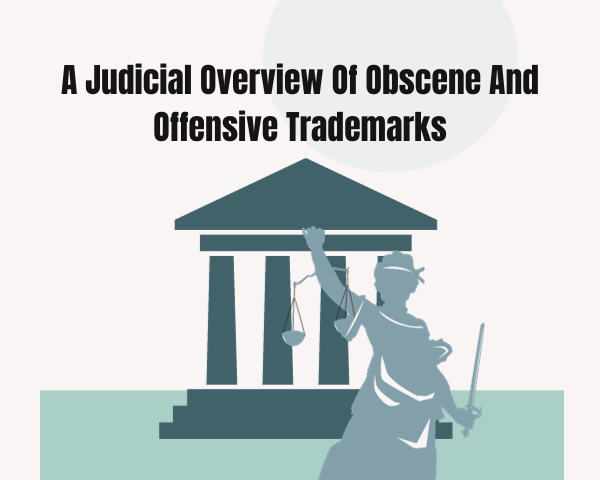We no longer use a brand name to identify the origin of the product. Nowadays, the brand name also serves as the reputation of the company. The easy access to the internet has not only made business easier but also made creating duplicate products simple.
In general, trademarks protect brand images within particular geographical regions. However, brands trying to expand their business at an international level often find that there are several counterfeit similar products in the market in different countries. They are often left in a difficult situation to prove the ownership of their brand. Let us get to know more about the trans-border reputation of trademarks in India.
The Trade and Merchandise Marks Act of 1958 did not address the reputation of foreign marks in India. However, in compliance with the TRIPS agreement, India, in the Trademarks Act, 1999, discussed the concept of the well-known mark.
Section 11 of the Trademarks Act 1999, lists down criteria under which we can consider a trademark as well-known:
– recognition or knowledge about the trademark among the public due to extensive promotion by the foreign company;
– the extent, duration, and location of the use of the trademark;
– the extent, duration, and location of the promotion of the mark. Promotions include advertising, presentation, and publicity of the product at fairs or exhibitions related to the goods and services of the trademark;
– the geographical location and duration of any application for registration or a registration certificate that recognizes and reflects the use of the trademark.
– record showing proper enforcement of the mark as a well-known trademark in any Registrar or court.
Goodwill and reputation
India mostly refers to judgments in United Kingdom courts to arrive upon decisions on cases related to trademark law. The English law considers goodwill as a form of legal property. Hence, it requires the brand or business to exist in the market for it to be considered well-known. Whereas, reputation does not require any business to survive. It solely relies upon knowledge of the people in that geographical area.
Indian courts take a different approach, unlike the English courts, when it comes to goodwill and reputation. They consider the terms goodwill and reputation synonymously to establish a mark as well-known.
Let us take a peek into a few cases where Indian courts used the term goodwill and reputation interchangeably and protect foreign marks.
Kamal Trading Co., Bombay versus Gillette U.K. Limited Middle Sex, England
The Gillette U.K. Limited sought an injunction against the use of the mark ‘7 o’clock’ for blades by the Indian company Kamal Trading Co. However, the blades with the mark were not sold in India since 1958. Hence, from the British perspective, there was no goodwill of the mark.
Bombay High Court deviated from the British perspective. It declared that one could not consider there is no goodwill just because there are no products available in the mark in a particular country. Nowadays, it is easy to transport goods from country to country. The manufacturer’s goodwill is not limited within a country as there are giant advertisements available in magazines, newspapers, and other media.
Apple Computer Inc. versus Apple Leasing & Industries
In this case, an Indian company was using the brand name of a famous computer brand Apple. Delhi High Court observed that owing to globalization, the popularity of the plaintiff needn’t be restricted within a jurisdiction.
Usually, in passing-off cases, the court considers situations where the public is deceived, and there is a possibility of confusion between two brand names. Such activities may, in turn, incur a loss to the plaintiff. The ultimate aim of businesses advertising their brand name is to create an impact on consumer’s minds who require similar services or products. Moreover, the plaintiff has spent time, money, and effort in building their brand name.
Hence, the court concluded that it would not be right for the plaintiff to lose control over their brand name due to improper and unauthorized use of the name by the defendant.
However, it is essential to understand that in the two cases given above, the plaintiff is quite popular on an international level. Besides, the public of the relevant section recognizes the brand name.
Whirlpool Co. versus N.R. Dongre
In this case, there was a dispute over the mark ‘Whirlpool.’ The plaintiff was already selling washing machines in the brand name in India to a section of people. Besides, the company was also carrying out extensive advertising in Indian newspapers, magazines, and media.
Delhi High court came up with judgment in favor of the plaintiff. It stated that the goodwill and reputation of a brand do not depend on the availability of the product in the market. It lies mainly on the knowledge of the brand among people in that locality.
The Whirpool case judgment was a benchmark judgment. It has paved the way for several such similar cases to uphold the transborder reputation of foreign brands in India.
The amendments to Trade Mark Rules in 2017 further enhances the transborder reputation of foreign marks. An international organization can apply to the Trademarks Office to declare its mark as a well-known mark in India. The applicant must submit adequate evidence showing that the public is aware and has knowledge about their mark.
Indian Trademarks law honors the transborder reputation of foreign marks in its best possible way. Our Indian intellectual property system understands the fast-changing world and gives its best to keep pace with it. The measures taken by India to protect the transborder reputation of foreign marks creates a favorable environment for international organizations to thrive securely in our country.




